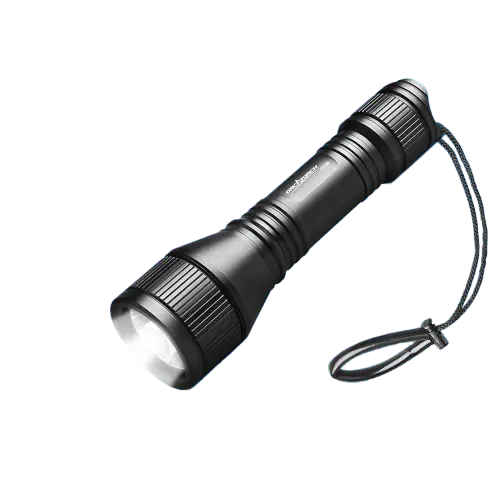
With attractive upgraded features, the Orcatorch D550 is a super lightweight and portable diving light. Its cover is crafted from aircraft-grade aluminum and hard-anodized to diamond-quality standards.
The Orca Torch models from Blue Reef are among the least expensive with rechargeable batteries among lights with rechargeable batteries. The wrist mounts were another selling point for me, as they free up one’s hands to do other tasks.
The D550 appealed to me because it had two adjustable brightness settings, whereas a more expensive model had a third set that was so low that it might not be practical for night dives. It required a rechargeable battery, but that more expensive model did not have one.
In addition to enhancing conductivity and withstanding high water pressure, the Orcatorch D550 provides exceptional corrosion resistance in seawater. Furthermore, 91% of light is transmitted by the Cree LED in this revamped version.
As a result of the tail magnetic switch’s improved sensitivity, the brightness mode can be easily switched depending on the diving environment. The Orcatorch D550’s biggest weakness is its battery life. In preparation for a recent trip to Bonaire, I purchased a primary dive light and a backup dive light.
It has been my experience that renting dive lights can add up over time, relative to buying your own, and I planned to dive for six nights during this trip. Choosing a rechargeable light as my primary light and a disposable light as my backup light was an easy decision.
The diving torch is powered by two 18650 Li-ion batteries with 3400mAh capacity, but even on low settings, it stops working after over 5 hours. In the future, the manufacturer should focus more on improving the D550’s runtime.
Key Features
Brand: ORCATORCH
Magnetic tail switch
Mode of strobe
Double-sided optical glass
Surfaces hard-anodized to diamond-grade
Aluminum alloy reflector
Our Overall Review
4.6
Reasons to buy:
Reason to Avoid:
Where to Buy?

4.6 / 05
ORCATORCH D550 Diving Light
Check out the Complete List of the Best Scuba Dive Lights

There are many individuals who are passionate about scuba diving, but there are only a few who are equally passionate about writing about scuba diving gear. One such person is Sarah, a scuba diver and writer who is based in a coastal town in Australia.
Shakira’s love for scuba diving started when she was a teenager. She was fascinated by the underwater world and the beauty of the marine life that thrived beneath the surface of the ocean. As she grew older, her interest in scuba diving only intensified. However, it was not until she started working in a dive shop that she began to appreciate the importance of scuba diving gear.
Shakira quickly realized that having the right scuba diving gear could make or break a diving experience. She also noticed that many divers did not fully understand the importance of choosing the right gear or how to use it properly. This realization sparked her interest in writing about scuba diving gear.
Shakira began to write articles for scuba diving magazines and blogs, sharing her knowledge and expertise on various types of scuba diving gear. She covered everything from wetsuits and fins to regulators and dive computers. Her articles were well-researched and informative, and they quickly gained a following among scuba diving enthusiasts.
What set Shakira apart from other scuba diving writers was her ability to explain complex gear concepts in a way that was easy for divers to understand. She had a talent for breaking down technical jargon into simple terms, and her writing was always clear and concise.
In addition to writing, Shakira continued to dive and test different types of scuba diving gear. She wanted to ensure that her articles were based on firsthand experience and that she could provide practical advice to divers.
Today, Shakira is considered one of the leading writers on scuba diving gear. Her articles are highly respected among the scuba diving community, and she continues to educate and inspire divers around the world. Her passion for scuba diving gear is infectious, and she has helped countless divers make informed decisions about the gear they use on their underwater adventures.
